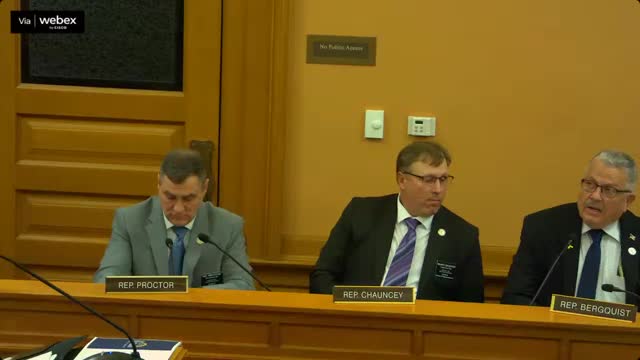Kansas bidding process under scrutiny as evaluation documents reportedly destroyed
January 22, 2025 | Committee on Insurance, Standing, HOUSE OF REPRESENTATIVES, Committees, Legislative, Kansas
This article was created by AI summarizing key points discussed. AI makes mistakes, so for full details and context, please refer to the video of the full meeting. Please report any errors so we can fix them. Report an error »

In a recent meeting of the Kansas House Committee on Insurance, significant discussions emerged regarding the evaluation process for a major state bidding initiative. The meeting highlighted concerns over transparency and accountability in the scoring and selection of bidders for state contracts, particularly in the context of a tie between two bidders.
The committee examined the technical proposal evaluation process, which involved four committees from the Kansas Department of Health and Environment (KDHE) and the Kansas Department for Aging and Disability Services (KDADS). During this process, 36 technical questions were scored, with a maximum possible score of 1,000 points. The results revealed that Sunflower and United, both incumbents, received the highest scores, while Aetna and Healthy Blue were tied at 522 points.
A key point of contention arose when a committee member questioned how the tie between Aetna and Healthy Blue was resolved, noting that the tabulation sheets used to break the tie were not made public. This lack of transparency raised concerns about the decision-making process and the criteria used to determine the final outcomes. The committee member expressed frustration that the reasons behind the tie-breaking decisions were not documented or accessible for review.
In response, officials acknowledged that the individual evaluations conducted by committee members were not retained, as the consensus evaluation process was deemed sufficient to drive the final scoring. This decision to dispose of the individual evaluations has sparked further inquiries into the integrity of the evaluation process and the need for clearer documentation in future bidding scenarios.
The discussions also touched on broader implications for service delivery, including concerns about benefit levels, service wait times, and backlogs, which are critical issues for constituents relying on state services. As the committee continues to navigate these complex topics, the need for improved transparency and accountability in state contracting processes remains a pressing concern.
The meeting underscored the importance of clear communication and documentation in government processes, particularly when public funds and services are at stake. As the committee prepares for future discussions, stakeholders will be watching closely to see how these issues are addressed and what measures will be implemented to enhance the integrity of the bidding process.
The committee examined the technical proposal evaluation process, which involved four committees from the Kansas Department of Health and Environment (KDHE) and the Kansas Department for Aging and Disability Services (KDADS). During this process, 36 technical questions were scored, with a maximum possible score of 1,000 points. The results revealed that Sunflower and United, both incumbents, received the highest scores, while Aetna and Healthy Blue were tied at 522 points.
A key point of contention arose when a committee member questioned how the tie between Aetna and Healthy Blue was resolved, noting that the tabulation sheets used to break the tie were not made public. This lack of transparency raised concerns about the decision-making process and the criteria used to determine the final outcomes. The committee member expressed frustration that the reasons behind the tie-breaking decisions were not documented or accessible for review.
In response, officials acknowledged that the individual evaluations conducted by committee members were not retained, as the consensus evaluation process was deemed sufficient to drive the final scoring. This decision to dispose of the individual evaluations has sparked further inquiries into the integrity of the evaluation process and the need for clearer documentation in future bidding scenarios.
The discussions also touched on broader implications for service delivery, including concerns about benefit levels, service wait times, and backlogs, which are critical issues for constituents relying on state services. As the committee continues to navigate these complex topics, the need for improved transparency and accountability in state contracting processes remains a pressing concern.
The meeting underscored the importance of clear communication and documentation in government processes, particularly when public funds and services are at stake. As the committee prepares for future discussions, stakeholders will be watching closely to see how these issues are addressed and what measures will be implemented to enhance the integrity of the bidding process.
View full meeting
This article is based on a recent meeting—watch the full video and explore the complete transcript for deeper insights into the discussion.
View full meeting
